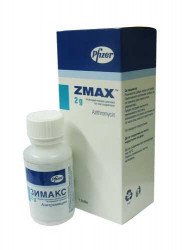Zmax (azithromycin) Coupons, Discounts & Cost
Zmax (azithromycin) is an antimicrobial drug from the group of cephalosporin antibiotics. One way to save money on the Zmax (azithromycin) retail cost regardless of income and insurance status is to use Zmax (azithromycin) coupons or discount cards from RXCoupons. Use our Zmax (azithromycin) coupons at your online pharmacy and receive up to 75% off the sale price each time you refill your prescription.
What is Zmax (azithromycin)?
Zmax (azithromycin) is an antimicrobial drug from the group of cephalosporin antibiotics. This antibacterial drug inhibits the development and reproduction of pathogens and treats infectious diseases of the respiratory, digestive and urinary system. The drug is not active against gram-positive bacteria resistant to erythromycin. It is used to treat the following inflammatory and infectious diseases: pharyngitis, tonsillitis, sinusitis, acute and chronic bronchitis, otitis media, uncomplicated urinary tract infections, uncomplicated gonorrhea.
The drug is available in the form of tablets, capsules, powder for injection. The main active substance is azithromycin.
When should I use Zmax (azithromycin)?
The drug is indicated to treat infections of the respiratory tract, larynx and ears, inflammation of the throat, inflammation of the lymph nodes, chronic pharyngitis, chronic tonsillitis with a decrease in the immune system, edema, inflammation of the vocal cords, inflammatory diseases of the middle ear, impetigo, dermatoses, urinary tract infections (gonococcal urethritis, cervicitis), Lyme disease, gastric/duodenal ulcer associated with Helicobacter pylori (in combination therapy).
This drug can be used successfully in scarlet fever accompanied by weakness, fever, edema and rash.
The drug is used in case of inflammation of the lungs, pneumonia, lung abscess, chronic bronchitis, acute diseases of the lower respiratory tract.
The antibiotic is also used against sexually transmitted diseases and genital infections - gonorrhea, urethritis and cystitis.
The drug can be used for dermatological skin lesions, erysipelas, pyoderma (caused by Staphylococcus aureus and Streptococcus pyogenes), impetigo.
Zmax (azithromycin) contraindications
- Allergic reactions. - Instability of the heart rate, arrhythmia. - Pregnancy, lactation. - Impaired renal function/liver function. - Children 0-1 years old.
How can I use Zmax (azithromycin)?
You should consult with your doctor before you start taking Zmax tablets. Please carefully read these instructions before using Zmax.
Zmax capsule is taken orally, 2 hours after or one hour before a meal, for 3 to 5 days.
Upper respiratory infections - 500 mg once a day, for 3 consecutive days.
Infections of the genital area - 1 g once daily.
Peptic ulcer disease, gastrointestinal diseases - 1 g a day, for 3 days.
Zmax (azithromycin) side effects
Zmax treatment may lead to kidney disease, nausea, diarrhea. Digestive system: diarrhea, nausea, abdominal pain, flatulence, vomiting, cholestatic jaundice, constipation, loss of appetite, gastritis, oral candidiasis. Cardiovascular system: palpitations, chest pain. Nervous system: dizziness, headache, vertigo, drowsiness, hyperkinesia, anxiety, neurosis, sleep disorders. Genitourinary system: vaginal candidiasis, nephritis. Allergic reactions: rash, hives, itching, angioedema, bronchospasm. Local reactions: pain and injection site inflammation. Other reactions: asthenia, photosensitivity, conjunctivitis.
Zmax (azithromycin) overdose
Symptoms: severe nausea, temporary hearing loss, vomiting, diarrhea.
Zmax (azithromycin) special instructions
The missed dose should be taken as early as possible.
Please observe a break of 2 hours, while the use of antacids.
Zmax is not used in children and adolescents under 16 years.
Zmax (azithromycin) interaction
Antacids, ethanol and food may slow down and reduce the absorption of azithromycin.
Macrolides and warfarin may increase the anticoagulant effect (close monitoring of the prothrombin time may be required).
Azithromycin should be used with caution with digoxin, ergotamine, dihydroergotamine, triazolam.
Azithromycin slows down and increases plasma concentration and toxicity of cycloserine, indirect anticoagulants, oral hypoglycemic drugs, methylprednisolone, felodipine, carbamazepine, terfenadine, cyclosporine, valproic acid, disopyramide, bromocriptine, phenytoin, theophylline, xanthine derivatives, etc.
Azithromycin is incompatible with heparin.

